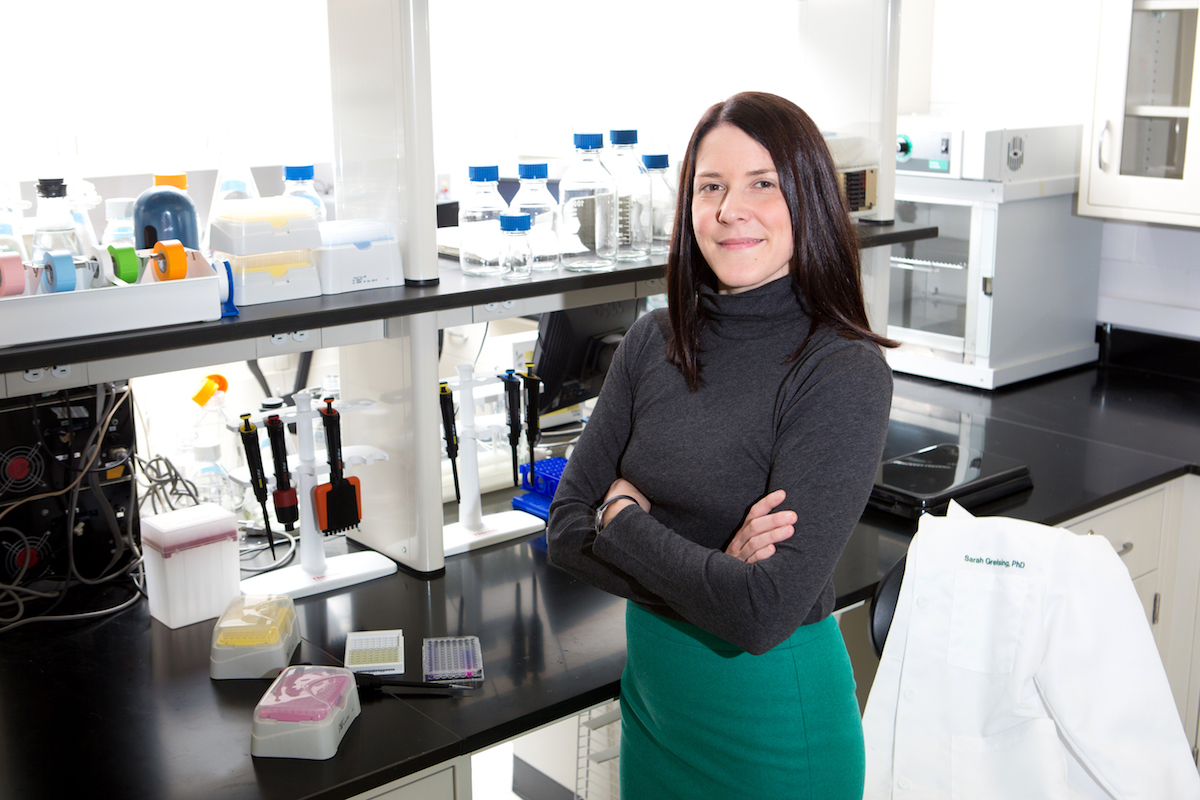A person who suffers a traumatic injury can face a future forever changed. Traumatic injuries such as those sustained during military combat can lead to permanent disability, limb loss, or worse.
Sarah Greising, assistant professor of exercise physiology in the School of Kinesiology, is seeking to help change for the better the lives of people who experience such injuries.
“I’ve always been fascinated by how quickly muscles can change and heal themselves,” says Greising. “Some people can regenerate muscle. Others lack the ability to regenerate. Why?”
Greising directs the school’s Skeletal Muscle Plasticity and Regeneration Laboratory, where her team explores strategies to address traumatic muscle injuries through regenerative rehabilitation, a process that stimulates cells to repair and regenerate damaged tissue. Specifically, Greising studies skeletal muscle physiology and volumetric muscle loss, which is caused by traumatic injury.
Before joining the kinesiology faculty last spring, Greising received her PhD in rehabilitation sciences at the U of M Medical School and ran a research laboratory at the U.S. Army Institute of Surgical Research, where she encountered soldiers who had experienced major trauma in combat. She saw injury to bones, the vascular system, and skeletal muscle.
“These are young people,” she says. “They have a long life to live. There are long-term questions of how these injuries will affect them. How do you change something to help them function and live better?”
Trauma patients often suffer multiple major injuries, Greising notes, and the skeletal muscle aspect can be overlooked. In some cases, patients are presented care options related to whether a limb should be salvaged or amputated.
“Sometimes they don’t have a choice,” she says, “but we want to be able to give the patient some options and a holistic way of looking at the problems.”
Traumatic injury can have many causes other than war, such as car and motorcycle accidents, as well as mass tragedies.
“These seem to be happening more often,” she says. “But as civilian and military medicine advances, more of these injuries are survivable.”
Greising’s academic background in exercise science (BS), health and human performance (MS), and rehabilitation science (PhD) has provided her with wide-ranging perspectives on advancing the study of regenerative rehabilitation. She sees potential for collaboration with colleagues in areas such as biomedical engineering, stem cell biology, and physical therapy.
“Lots of groups are working on this,” she says. “Everyone looks at a problem through their own lens.” They bring new ideas and different approaches to addressing the issues.
Greising is also involved in research studies with U Medical School alumnus and former classmate Jarrod Call, PhD ’11, now an assistant professor at the University of Georgia, that involve the use of exercise and electrical stimulation to promote regeneration. Greising and Call were recently awarded a Department of Defense grant to further their studies.
“The regenerative rehabilitation field is fairly new and is becoming more multidisciplinary,” says Greising. “The teacher side of me wants to open windows to other applications of exercise physiology. I have a few undergraduates thinking about pursuing physical therapy, and they are seeing how they can develop rehabilitative programs that address traumatic injury. I think in the next 10 years we’ll discover more scientific ways of combining regenerative medicine and rehabilitation for the best outcomes in lifelong function.”
Learn more about Sarah Greising and the School of Kinesiology.
Story by Marta Fahrenz | Photo by Erica Loeks | Winter 2019
 Sarah Greising
Sarah Greising